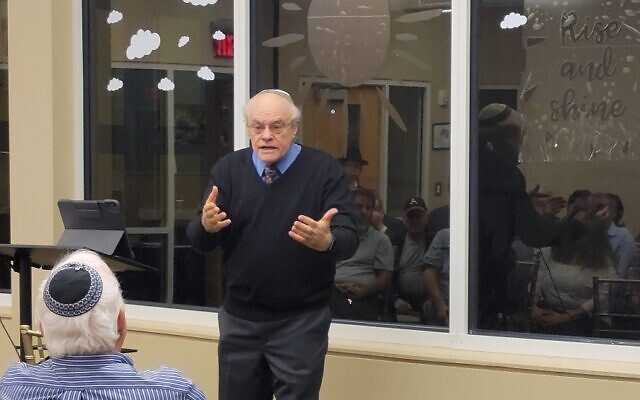Ken Stein Addresses Israel’s Protests of Judicial Overhaul
Held at Congregation Beth Tefillah, the program may have been the first community event specifically covering the civil crisis in Israel.

In what was most likely the first program open to the Atlanta Jewish community to learn about Israel’s proposed judicial overhaul and its resulting civil uprising, professor Ken Stein of the Center for Israel Education spoke at Congregation Beth Tefillah on March 30.
While maybe 50 people were physically in attendance, easily 70 more watched on Zoom from their homes.
Stein explained the form of governance in Israel and the complicated elements of the proposed legislation that critics contend would severely weaken the judiciary, and supporters say would rebalance the equilibrium between branches of government. The program, which was produced in only one week, was co-sponsored by Beth Tefillah, Stein’s Center for Israel Education, Chabad Israeli Center, The Torah Center Atlanta, and a couple of individuals.
The long-time Emory University professor didn’t mince words in his description of Israeli society in the last 90 days since prime minister Benjamin Netanyahu’s justice minister announced his proposed overhaul of the country’s judicial system, which will put more power in the hands of the coalition government. Comparing the increasingly inclusive group of protesters and their impact on Israel’s economy, military and social cohesiveness to an earthquake, Stein described it as an 8.5 on the Richter scale.
Noting that he is neither a lawyer nor legal historian, Stein said that the struggle between Israel’s legislature, the Knesset, and the country’s Supreme Court is not new. In fact, the “tussling” has been going on for more than two decades. He was clear, however, that he could not predict how it will end up. He explained the composition of the Supreme Court and how the judges are appointed, and squashed the claims that the present court is comprised of “liberal judges.” Indeed, half of the justices were appointed during previous Netanyahu governments. He called the allegation “nonsense.” He also explained the differences between how the justices are chosen in Israel vs. in the U.S.
Supporters of the Netanyahu government’s judicial proposals argue that the Supreme Court has taken power away from the Knesset. But Stein said that, in the last 20 years, only 22 Knesset laws have been overturned by the court. Four of those had to do with asylum seekers and four were concerned with Knesset decisions that had granted greater benefits to the ultra-Orthodox community, such as allowing their youth to avoid military service.
The latter issue was “part of the reason why people went into the streets.”
Stein also countered the claims that the Israeli public has taken a sharp right-wing turn. He said a majority of the body politic sees themselves in the center or center-right. And disputing assertions that Netanyahu won by a huge majority in the last election, Nov. 1, 2022, Stein called it a “close election,” with only a difference of about 50,000 votes out of 4.1 million cast. He contended that the difference may have only been due to the fact that two more left-wing parties failed to join forces before the election, resulting in one party not passing the minimum percentage of the vote to make it into the Knesset.
According to Stein, the anti-judicial overhaul protesters are mostly upset because “they are feeling like something is being pushed down their throats without them having a chance to digest it. People reacted more about the pace,” of the legislative agenda. Indeed, Netanyahu’s government had hoped to pass a number of its judicial legislative bills before the Knesset’s Passover recess and only placed the voting on pause when protesters essentially shut down the country on March 27.
That protest that ballooned overnight on March 26 into the next day had been building, but was spontaneous, after the dismissal of Israel’s defense minister, according to Stein. He also called it the “most important public demonstration” in Israel’s history, comparing it only to the protests that erupted after the massacre of innocent Palestinians in the refugee camps of Sabra and Shatila in Lebanon in 1982.
“Israel’s civil society has been heard from,” he said. “No one has ever seen this before,” referring to Israel Defense Force reservists refusing to show up for duty.
As an historian, Stein didn’t even try to predict what will happen after the Passover and Israeli secular holidays at the end of April. If the Knesset pushes through its proposed changes to the judicial system, and the sitting Supreme Court rules the legislation unconstitutional, “How do you reconcile the two? I don’t have an answer.” He questioned whether Netanyahu will decide if he’s more interested in his legacy, or more concerned with staying out of jail due to the corruption charges he’s fighting in an ongoing trial.
“The next several five or six weeks will be telling,” said Stein, at the end of March. “The last 90 days” have been “truly different in Israeli society.”



comments